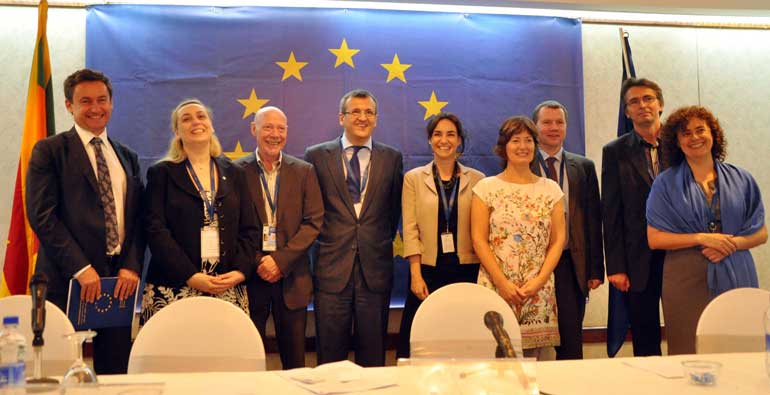-
EU Polls Observation Mission issues preliminary statement
This Statement is made prior to the completion of the election process. The mission’s overall assessment will be affected by the observation of the remaining phases of the process, including the tabulation of results and the handling of possible election complaints and appeals. On the invitation of the Commissioner of Elections of Sri Lanka, on 15 July the European Union deployed an Election Observation Mission (EU EOM) to observe the parliamentary elections. The mission is headed by Cristian Preda, Member of the European Parliament (Romania), and comprises 85 observers — from 28 EU member states, as well as from Switzerland and Norway — including a delegation of six members of European Parliament headed by Ignazio Corrao (Italy). The mission’s mandate is to conduct a comprehensive analysis and assess the extent to which the election process complies with international and regional commitments for democratic elections as well as with domestic law. The mission is independent in its findings and conclusions and operates in accordance with the Declaration of Principles for International Election Observation. Observers have been deployed across the country to all nine provinces and have met with election officials, candidates, political parties, media representatives, domestic observers and voters. On Election Day, observers visited 366 polling stations in all 22 districts to observe voting and counting. The EU EOM will remain in the country to observe post-election developments and the tabulation of results, and will publish a final report, containing detailed recommendations, within two months of the conclusion of the electoral process.
 EU Election Observation Mission 2015 Sri Lanka
EU Election Observation Mission 2015 Sri Lanka
The EU EOM wishes to express its appreciation for the cooperation and assistance it received during the course of its work from the citizens of Sri Lanka, the Government and the Commissioner of Elections and his office, the political parties and civil society organisations, the EU Delegation in Colombo, and Missions of the EU Member States.
Summary
The 17 August parliamentary elections in Sri Lanka were well administered and offered voters a genuine choice from among a broad range of political alternatives. Election Day was peaceful despite some minor incidents. Polling and counting procedures were assessed overwhelmingly positively by EU observers.
-
The Commissioner of Elections and his staff administered the elections in a transparent and impartial manner, demonstrated strong leadership, and enjoyed the confidence of all stakeholders. In addition to issuing circulars and guidelines throughout the campaign, the Commissioner had exceptionally broad powers to instruct any state institution, including media and the police. The wide interpretation of these powers, including that the Commissioner may order state outlets to halt broadcasts, challenged recently gained media freedoms. Violation of these directives constituted an offence punishable with fines and even imprisonment. At times, such decisions were vague and impracticable and were issued on an ad-hoc basis.
-
Candidate registration was inclusive. In total, 35 political parties and alliances as well as over 200 independent groups submitted their lists in 22 electoral districts; more than 6,000 candidates stood.
-
Freedoms of assembly and movement were respected during the campaign. Despite overly restrictive rules which curbed freedom of campaigning, inter alia, not allowing candidates to engage in door-to-door campaigning, to canvass in person or distribute leaflets or posters, candidates and party activists campaigned vigorously, focusing on small meetings with voters. Although the campaign was assessed by stakeholders as largely peaceful, incidents involving firearms resulted in several deaths, and there were numerous cases of assault and arson. The major incidents, however, appeared to be isolated and did not lead to an escalation of violence. There were also isolated reports of limitations to campaign freedom in the Northern Province.
-
Party and campaign finance are not regulated; there are no requirements regarding campaign spending limits or disclosure of donations and expenditures. According to interlocutors, the campaign was very costly with some candidates spending above EUR 500,000.
-
The legal framework overall provides an adequate basis for the conduct of democratic elections. However, a number of specific issues need to be reviewed to bring it fully in line with international standards and commitments agreed to by Sri Lanka. These include undue restrictions to suffrage rights, the absence of deadlines to adjudicate pre-election day complaints, and disproportional sanctions for some election offences.
There are no legal barriers to the participation of women in elections as candidates or as voters. However, in the absence of affirmative action measures, the participation of women was extremely low – only 9% of candidates were women.
-
Over 15 million voters were registered of a total population of approximately 21 million. The register from 2014 was used. As a result, citizens who turned 18 in the interim (estimated 300,000) were disenfranchised. Most interlocutors raised no concerns regarding the reliability and inclusiveness of the voter register.
-
The constitutional guarantee of freedom of expression was respected during the campaign. Journalists welcomed the freer media environment in which they now work. State media outlets provided a platform for various political parties. While preliminary results from the EU Election Observation Mission (EOM) media monitoring indicate state TV channels gave preferential treatment to the main ruling party, the accommodation of a plurality of viewpoints and the move towards balanced coverage are to be welcomed. Ownership and/or management of several private broadcast and print outlets is politicised, leading to coverage favouring particular candidates and parties, thus undermining the principles of balance and impartiality.
-
Despite the lack of legal provisions regarding domestic observation, civil society organisations carried out large-scale monitoring of misuse of public resources, campaign violations, voter education programs and polling and counting observation, and deployed some 20,000 observers on Election Day.
 EU Election Observation Mission 2015 Sri Lanka
EU Election Observation Mission 2015 Sri Lanka